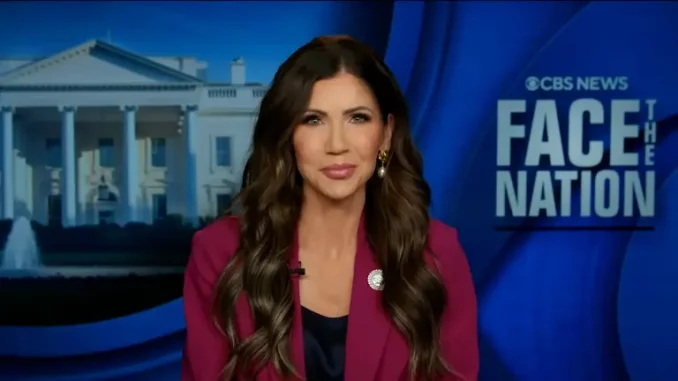
CBS News has overhauled its interview practices after a firestorm over claims from Homeland Security Secretary Kristi Noem that her remarks were deceptively edited out of a “Face the Nation” appearance.
| Published September 5, 2025
The Sunday public affairs show will now run live or live to tape interviews, after an edit to an interview with the Homeland Security Secretary drew pushback.
Truth or Trim? CBS Faces Backlash for Editing Noem’s ‘Face the Nation’ Interview
When Kristi Noem appeared on CBS’s Face the Nation, she intended to deliver a pointed message about alleged criminal activity. Instead, controversy erupted—prompting a rare and sweeping change in network policy.
1. The Allegations: What Was Cut—and Why It’s Significant
On August 31, Noem’s appearance was edited down from its original 16-minute and 40-second length—cutting out nearly four minutes, or over 23% of her remarks. The excised segment featured graphic allegations:
“This individual was a known human smuggler, MS-13 gang member… a wife beater… solicited nude photos from minors… his fellow human traffickers told him to knock it off… he was so sick… he needs to never be in the United States… our administration is making sure we’re doing all that we can to bring him to justice.”
Noem accused CBS of intentionally “whitewash[ing] the truth” by omitting these remarks, posting side-by-side clips to emphasize what viewers were deprived of.
2. Defense from CBS—and Criticism Grows
CBS responded by stating the edits were purely for time and adhered to network standards, highlighting that the full interview and transcript had been made publicly available on CBS News’ website and its YouTube channel. Yet, the Department of Homeland Security countered with a statement underscoring that the cuts effectively stripped away more than 23% of her comments that shed light on Abrego García’s alleged threats.
3. Ripples from the Past: CBS’s Track Record of Editing Controversies
This incident isn’t CBS’s first brush with accusations of deceptive editing. Earlier this year, Paramount Global settled a $20 billion lawsuit with President Trump over its handling of a 60 Minutes interview with Kamala Harris, which the network ultimately addressed by promising full transcripts and changes to its practices
4. Policy Shift: CBS Responds to Public Outcry
In light of the backlash, CBS has instituted a new policy: Face the Nation will now air only live or live-to-tape interviews, barring national security or legal constraints. They will also continue to post complete footage and transcripts online. Critics, however, question whether this opens the door for unchecked disinformation; proponents, on the other hand, view it as a step toward greater transparency.
Kilmar Abrego Garcia (center) leaves a Tennessee jail on Aug. 22.
CBS’s Explanation—and the Backlash That Followed
CBS responded by stating the interview “was edited for time” and “met all CBS News standards,” noting that full video and transcripts were posted online.
But pressure mounted quickly. The Department of Homeland Security criticized the network, stating the broadcast cut out more than 23%—nearly four minutes—of Noem’s total 16-minute-40-second segment.
Amid growing scrutiny, including comparisons to a previous CBS editing scare, the network enacted sweeping changes.
A Clear Shift: Face the Nation Will No Longer Be Edited (Except in Rare Cases)
By September 5, CBS announced it would air all future interviews on Face the Nation either live or live-to-tape, eliminating edits except where national security or legal considerations apply. Transcripts and full footage will remain available online.
Noem called the policy change a step in the right direction—but questioned why it took such a controversy to spur transparency. Others, including media veterans, welcomed the move, citing increased public trust and viewership curiosity. Critics, however, warned that removing editorial control entirely may allow false or misleading statements to go unchecked.
Echoes of a Lawsuit and a Broader Pattern
This isn’t the first time CBS found itself under fire for editing controversies. In 2024, former President Trump sued the network and its parent, Paramount Global, for $20 billion, alleging deceptive editing of a 60 Minutes interview with then–Vice President Kamala Harris. The lawsuit later settled for $16 million, under pressure from FCC scrutiny and during Paramount’s pending merger with Skydance Media.
The timing of this policy shift also coincides with leadership and editorial changes at CBS—possibly indicating a broader attempt to rebuild credibility in a politically charged media landscape.
 Implications of CBS’s Editing Controversy
Implications of CBS’s Editing Controversy
1. Media Bias Confirmed?
For many conservatives and right-leaning viewers, the CBS incident reinforces long-standing suspicions of mainstream media bias. By cutting Kristi Noem’s strongest remarks about MS-13 ties, human trafficking, and sexual exploitation, CBS appeared to downplay the severity of illegal immigration-related crime—a core issue for the political right.
The fact that Noem’s uncut version went viral on social media only deepened the sense that networks are gatekeeping information to protect certain narratives.
2. Immigration as a Political Flashpoint
The omitted content wasn’t just filler—it centered on gang violence, human smuggling, and child exploitation tied to illegal immigrants. Right-leaning commentators argue that cutting these details mutes the dangers of open border policies, potentially shielding the Biden administration (and Democrats in general) from criticism.
For immigration hardliners, this isn’t just sloppy editing—it’s evidence of media complicity in covering for failed border security policies.
3. The “Trump Precedent”
The backlash recalls Trump’s $20 billion lawsuit against CBS/Paramount for deceptive editing of a 60 Minutes interview. That case ended with a $16 million settlement—a fact many conservatives now cite as proof that CBS has a pattern of editing in politically sensitive ways.
For the right, this is less about one interview with Noem and more about a legacy of manipulation to favor Democrats.
4. The Win for Transparency
CBS’s new “live or live-to-tape only” rule is being hailed by right-leaning voices as a victory for accountability. Noem, by exposing the edits publicly, forced a powerful network to reverse its practices.
To conservatives, this shows that pushing back works—and that major outlets can be pressured into reforms when they are caught skewing coverage.
5. Risk of Backfire
Critics on the right also note that while the policy change is good, damage to trust is already done. The question remains: If CBS hadn’t been caught, would it have kept editing in ways that shape narratives?
Some conservative commentators warn that other outlets may quietly continue similar practices, meaning vigilance is necessary.
 Overall Takeaway:
Overall Takeaway:
The CBS editing controversy underscores what many on the right have argued for years—that mainstream outlets too often filter or soften stories that reflect poorly on progressive policies, particularly around immigration and crime. By trimming Kristi Noem’s strongest allegations against an MS-13 gang member tied to human smuggling and child exploitation, CBS appeared less like a neutral news outlet and more like a gatekeeper of narratives.
The network’s sudden reversal—promising to air interviews uncut—wasn’t born out of principle, but out of exposure. And while this change is welcome, conservatives see it as proof that constant scrutiny of the media is necessary. In the end, the incident is not just about one interview, but about whether Americans can trust their media to tell the whole story, especially when it challenges the left’s talking points.






Be the first to comment